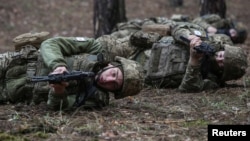KYIV -- On October 18, Roman Sopin called his mother and asked her to bring him some clothes, cash, and his contact lenses -- he had been swept off a Kyiv street by conscription officers and was preparing to be inducted into the Ukrainian Armed Forces to fight against invading Russian troops.
A day later, he was in the hospital with a severe head injury that turned out to be fatal: He died on October 23.
The military claims Sopin passed out, collapsed, and hit his head on the hard floor of the recruitment center where he had been taken in Kyiv’s Podil district, and that about 10 people, including other men who were being mobilized, witnessed the fall. It also says he had no injuries elsewhere on his body.
His family and their lawyer doubt it: They suspect the blunt-force trauma listed on a death certificate – along with cerebral hemorrhage, skull fractures, and a closed head injury – was the result of a deliberate act of violence.
“People don’t fall like that naturally. This was a powerful, professional blow,” the lawyer, Oleksandr Protas, told RFE/RL’s Ukrainian Service. He said Sopin, 43, had been healthy and had no history of fainting or falling.
Protas said he had encountered several cases in which men were beaten at the Podil recruitment center and at one in the Svyatoshyn district.
Whatever the truth, Sopin’s death has focused heightened attention on Ukraine’s manpower problems and the violence that recruiters sometimes use against men they are seeking to bring into the military.
It followed shortly after two incidents of alleged brutality that trained a spotlight on recruitment methods that continue to cause concern more than a year after a controversial mobilization law was adopted in the spring of 2024.
In Kyiv, a court ordered house arrest for two police officers suspected of exceeding their authority in the beating of a man outside a district recruitment center. Grainy, bluish security-camera footage from October 17 shows two officers repeatedly kicking and hitting a man who lies prone in the open door of a police van.
Two days earlier, police in the Ternopil region in western Ukraine detained seven military personnel suspected of several crimes, including torture and extortion, in connection with the alleged mistreatment of several men, some of whom were not potential recruits but fellow soldiers who were undergoing rehabilitation after being wounded in the war.
This form of mobilization is known as “busification” because men who are accosted by conscription officers or soldiers from units seeking conscripts and cannot prove they are exempt from service are sometimes bundled into buses and taken in for induction into the military.
One alleged victim in Ternopil told police he was assaulted outside a recruitment center by attackers who forced him into a van, drove him away, beat him, threatened him with a weapon, and demanded 50,000 hrynyas ($1,190) for his release. Authorities said the suspects stole a car from another Ternopil resident, which was later found near Kyiv.
'Cynically Indifferent' Police
Sopin’s mother, Larysa Sopina, shares the lawyer’s doubt about the official claim that her son “lost consciousness and fell,” she told RFE/RL, saying that it did not seem to fit with the finding of blunt force trauma.
Sopina is frustrated about her treatment by the authorities, who she suggested have consistently stonewalled her efforts to find out what happened to Roman.
"No one has contacted me at all. I have the feeling that the police are completely cynically indifferent,” she said.
Protas said that when he first went to the Podil police precinct, he was told that the cause of the alleged fall “must be epilepsy,” but that Sopin had no history of epilepsy.
“From the beginning, the police were trying to cover up the case,” he said. Kyiv police and military authorities deny a cover-up or any other wrongdoing.
Violence is one of several problems plaguing Ukraine’s campaign to mobilize more men to fight against Russia’s full-scale invasion, which will reach the four-year mark on February 24, 2026.
President Volodymyr Zelenskyy’s government barred men aged up to 60 from leaving the country after the start of the invasion in February 2022, though in late August it relaxed the rules for those aged 18-22, resulting in a sharp spike in the numbers of men in that age group leaving Ukraine in September and October. Kyiv has resisted pressure to lower the draft age to 18 but decreased it from 27 to 25 last year.
Absence without leave, desertion, and flight from Ukraine also pose serious challenges.
Authorities opened more than 110,000 AWOL investigations in the first months of 2025, according to Prosecutor-General’s Office figures reported by Ukrayinska Pravda -- more than half the total number since the start of the invasion. More than 50,000 desertion cases have also been opened since February 2022.
Russia has its own mobilization problems.
More than 1 million of its soldiers have been killed or wounded, according to Ukraine and Western intelligence agencies, and it continues to suffer massive losses as its forces slowly push forward along the front line in the Donetsk region. Increasingly, Moscow is juggling economic constraints with its efforts to replace the troops who have been killed or put out of action.
But analysts say Putin is confident that Russia will prevail and is determined at the very least to seize the part of the Donetsk region that remains under government control, suggesting that financial pressures and the growing casualty count will not push Moscow to make concessions any time soon.
With US President Donald Trump’s effort to broker an end to war running up against recalcitrance in the Kremlin, there’s little sign of peace – or even a cease-fire, which Washington and Kyiv favor but Moscow opposes – in sight.













